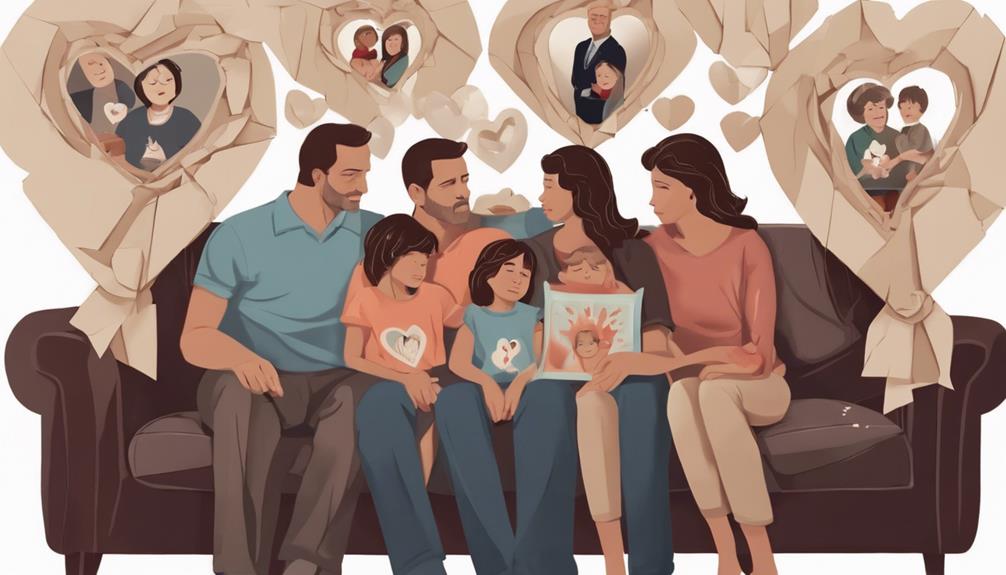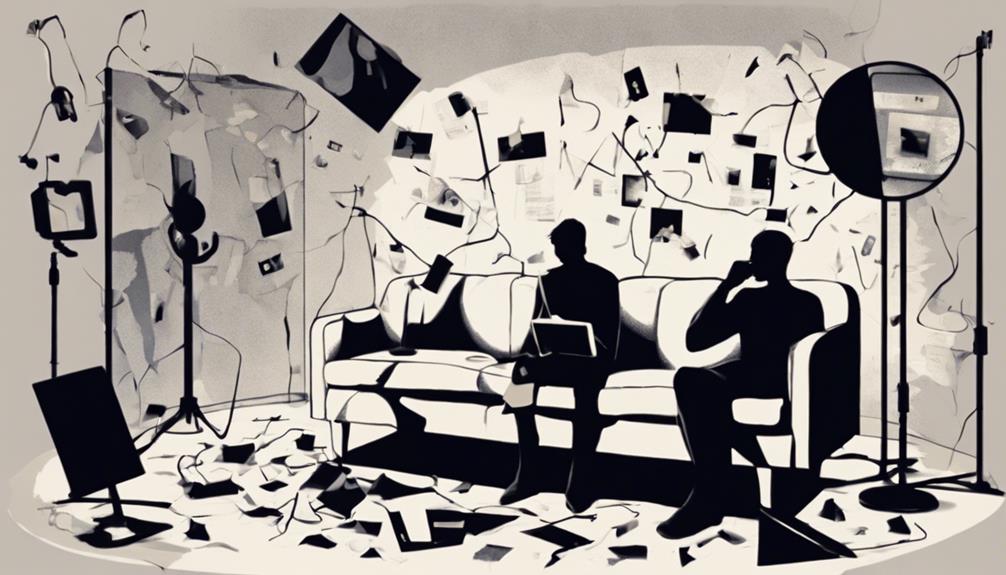Betrayal in marriage shakes the very foundation of trust, leaving deep emotional scars for both partners. You might experience hurt, confusion, and anger, which can ripple out, affecting your entire family. Children feel the strain and may struggle with divided loyalties. Communication barriers often arise, leading to misunderstandings and resentment within the family unit. It's normal to question your self-worth, and healing takes time. However, acknowledging these impacts is the first step to rebuilding. With commitment and open dialogue, you can start to mend the emotional wounds. There's more to explore on how to navigate this challenging journey.
Understanding Betrayal in Marriage

Betrayal in marriage often feels like a deep wound, leaving partners grappling with feelings of hurt, confusion, and mistrust. When trust is broken, it shakes the very foundation of your relationship. You might find yourself questioning not just your partner's fidelity but also their commitment to the emotional intimacy you once shared. This breach can create a chasm, making it difficult to communicate openly and honestly.
Understanding betrayal requires you to recognize its complexity. It's not merely an act of infidelity; it often stems from unmet needs, emotional disconnect, or unresolved conflicts. You might wonder how something that once felt safe and intimate turned into a source of pain. This questioning is normal, and it's essential to give yourself space to process these emotions.
Rebuilding marriage trust takes time and effort from both partners. It involves acknowledging the hurt, reassessing boundaries, and finding ways to reconnect on a deeper level. As you navigate this tumultuous journey, remember that healing is possible. With patience and open dialogue, you can work toward restoring the emotional intimacy that once defined your relationship.
Emotional Consequences of Betrayal
The emotional fallout from a partner's infidelity can be overwhelming, leaving you to wrestle with feelings of anger, sadness, and insecurity that may linger long after the initial shock. This emotional trauma often manifests as a deep sense of betrayal, making it difficult to trust not only your partner but also yourself.
You might find yourself questioning your self-worth, wondering what you could have done differently to prevent the betrayal aftermath.
As you navigate these turbulent emotions, it's essential to acknowledge how they can affect your daily life and interactions. You might feel isolated, struggling to express your pain to friends or family, fearing their judgment or misunderstanding.
It's also common to experience mood swings, anxiety, or even depression as you process this profound loss.
Finding a safe space to express and explore your feelings is important. Whether through therapy, support groups, or trusted friends, sharing your experience can help you begin to heal.
Trust Issues and Their Effects

Trust issues often emerge as a direct consequence of infidelity, creating a shadow that looms over your relationship and complicates future interactions. You might find yourself second-guessing your partner's every move, leading to a cycle of suspicion and anxiety. This constant doubt can create significant communication barriers, making it hard for you to express your feelings openly.
As trust erodes, the foundation of your relationship weakens, leading to misunderstandings and conflict. You may feel isolated, longing for a sense of security that now feels elusive. Acknowledging these feelings is essential, as they're a natural response to betrayal.
For trust restoration to occur, both you and your partner need to commit to honest dialogue and vulnerability. It requires patience and effort from both sides to rebuild that fragile trust. Open conversations about your feelings can help dismantle the barriers, allowing for healing and growth.
Impact on Family Dynamics
Infidelity can deeply disrupt family dynamics, creating rifts that affect not just the couple but also children and extended family members. When trust is broken, the traditional family roles often shift, leading to confusion and instability. Children may feel torn between parents, unsure of whom to trust or support. This can lead to emotional distress, impacting their development and relationships.
Moreover, communication barriers greatly increase during this time. You might find it hard to express your feelings or needs, leading to misunderstandings and resentment. When open dialogue breaks down, issues fester, making it challenging for family members to navigate their feelings. As a result, the entire family system can feel strained, with members retreating into silence or reacting with anger.
Recognizing these shifts is essential. Acknowledging the impact of infidelity on family dynamics helps you understand the broader emotional landscape. By addressing the underlying issues and working to rebuild communication, you can begin to mend the rifts and restore a sense of stability within the family. It's a difficult journey, but with empathy and support, healing is possible.
Coping Strategies for Affected Families

Steering through the aftermath of betrayal can feel overwhelming, but implementing effective coping strategies can help families regain a sense of balance and connection.
Start by prioritizing open communication techniques. Encourage family members to express their feelings honestly, fostering an environment where everyone feels heard and validated. This transparency can help ease tensions and build trust over time.
Additionally, consider reaching out to support networks, such as friends, family, or professional counselors. These connections can provide emotional backing, offering perspectives and guidance that may be hard to find within the family unit. Sharing experiences with others who've faced similar issues can also be incredibly healing.
Establishing routines can further enhance stability. Regular family meetings or activities can help create a sense of normalcy, encouraging bonding despite the turmoil.
Remember, it's crucial to approach these strategies with patience and compassion, both for yourself and each other. Healing from betrayal is a journey, and taking small, intentional steps can lead to significant progress.
You're not alone in this; support is available, and together, you can navigate the path toward recovery.
Rebuilding Relationships After Betrayal
Rebuilding relationships after betrayal requires both partners to engage in honest conversations that address the pain and misunderstandings that have arisen.
It's important to create a safe space where both of you can express feelings without fear of judgment. This openness lays the groundwork for the forgiveness process, which is essential for healing.
As you navigate this journey, acknowledge that forgiveness doesn't mean forgetting but rather choosing to move forward together. Both partners must actively participate, acknowledging their roles in the relationship's dynamics.
This can spark deeper discussions about trust and boundaries, which are crucial for rebuilding intimacy.
Take small, intentional steps to reconnect. This might include date nights, shared activities, or simply checking in with each other daily.
Rebuilding intimacy takes time and patience, so be gentle with yourselves as you progress.
Seeking Professional Help

Seeking professional help can provide both partners with the guidance and tools necessary to navigate the complex emotions and challenges that arise after a betrayal. Couples therapy offers a safe space where you can openly discuss your feelings, fears, and frustrations without judgment. A skilled therapist can facilitate these conversations, helping you both articulate your needs and desires more effectively.
In the wake of betrayal, communication skills often break down. You may find it difficult to express your emotions or listen to your partner's perspective. A therapist can teach you how to communicate in a way that fosters understanding and healing, rather than conflict.
They can also help you identify patterns in your relationship that may have contributed to the betrayal, allowing you to address these issues constructively.
Conclusion
Betrayal in marriage can ripple through relationships and families, leaving emotional scars that are hard to heal.
It's crucial to acknowledge the pain and trust issues that arise, as they can affect everyone involved.
However, with open communication and commitment to healing, you can rebuild the bonds that were strained.
Seeking professional help can guide you through this challenging process, fostering understanding and support.
Remember, while the road to recovery may be tough, it's possible to emerge stronger together.



































